
In the modern digital era, millions of people take various mobile devices as a way to simplify their routine. In fact, mobile apps usage is not less than 80% of time that an average American spends with a smartphone in their hand.
A wide range of the existing applications isn’t surprising today – we use them to order groceries and other goods, search homes, improve skills and learn various things, keep track of our habits, meet people, and so much more.
A good investment is medical apps for patients and doctors. Well-developed, they provide basic healthcare for many people wherever and whenever, letting them prevent diseases, receive professional consultations, and monitor their well-being.
In this blog post, you’ll learn more about medical apps’ benefits, types, and features. We’ll also share how much time and budget you need to plan, how to choose a healthcare app development company for your project, and what troubles you may face when launching the end-product.
If you’re reading this article, you might already have healthcare app ideas. Before discussing it with a development team, and even before starting to create your business plan, you need to take time and study the medical software industry.
What is its current state? Are there any changes predicted by the market analysts?
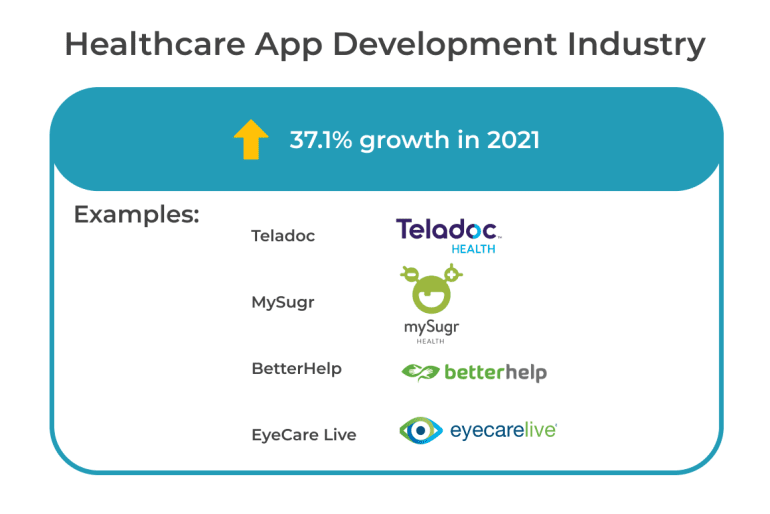
What's good to know about the telemedicine industry
The Gallup research has found that around 20% of Americans use mobile medical applications or wearable health trackers. Most users are women and young adults.
According to the latest Global Digital Health Market report, the healthcare app development industry will significantly grow (at 37.1%) in 2021 and continue thriving – $508.8 billion worth by 2027.
Here are several popular medical apps for patients:
You may say these are the best healthcare apps in the specific fields of the industry. Each of them has found a perfect market niche. When developing healthcare applications, you should consider the industry’s tendencies and trends to fully understand how your product may fit into and what kind of value it brings to users.
Medical mobile application development is a vast and diverse industry. Naturally, there are different categories of healthcare apps, each of which fulfills specific demands.
Emergency apps. Those are an interesting kind of medical apps – for patients they may become life-savers. Usually there is a Help button for users to press in case of emergencies. It activates a direct call to the hospital and automatically identifies your location. It’s also possible to build functionality for less critical situations. For instance, healthcare app developers can integrate a map and a taxi-hailing service to find nearby clinics and take a patient to one of them.
Telehealth / telemedicine apps. Healthcare mobile app development can come in various forms, including remote connection between a user and a medical professional. In this subgroup, you’ll also find mobile medical applications that allow remote monitoring of oxygen levels or ECG results, giving E-prescriptions, etc.
Healthy lifestyle apps. It’s one of the shining examples of healthcare mobile application development. Such apps track users’ well-being and physical condition – e.g., during pregnancy, on any kind of a diet, while doing fitness and sports.
A healthy lifestyle app typically:
This subgroup also includes applications for motivation, habit tracking, meditation, etc. There is another type of lifestyle digital products – a drug tracking app. It allows you to stick with schedules and doses; moreover, it sends reminders on appointments, check-ups, etc.
Medical training apps. In this case, medical mobile application development isn’t meant for patients’ demands. It aims at education for doctors and nurses, providing valuable materials on diseases, treatments, and drugs through educational courses and even games.
Clinical assistance apps. These are healthcare applications for medical professionals offering lab results, digital images, symptom checkers and other helpful functions for diagnosing. If you broaden this functionality and systematize all medical information about each patient, you’ll get EHR/EMR apps. They work with Electronic Health Records and Electronic Medical Records, respectively. The main function of EMR systems is storing patients' treatment history within one clinic or practice, while EHR applications enable safe information exchange for healthcare providers.
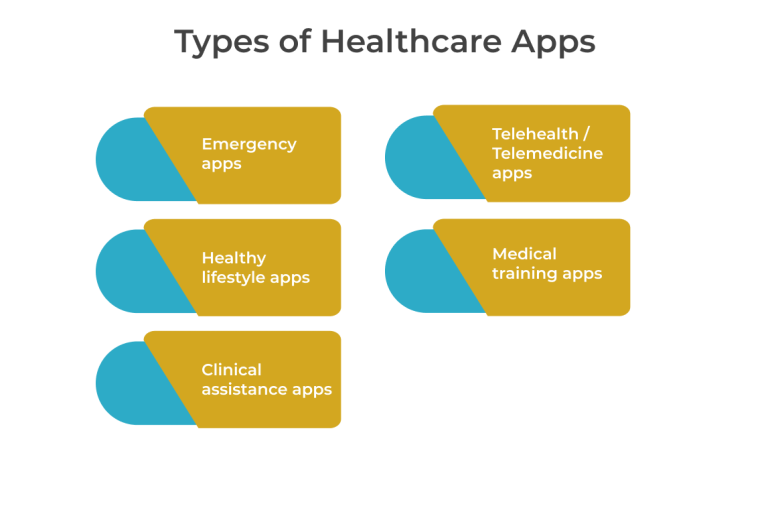
The many faces of medical apps
Why is your app’s type important for healthcare mobile app development? It’s because different applications have different purposes and audiences. For example, EMR applications normally have a dashboard to share the most important information and visualize it for physicians, while medication tracking apps usually don’t have this feature.
The main benefit of medical apps for patients is that they give anyone access to basic healthcare. It becomes crucial for people from faraway villages, the poorest countries, or areas affected by war. Moreover, mobile medical applications play a great role during the COVID-19 pandemic because they work remotely.
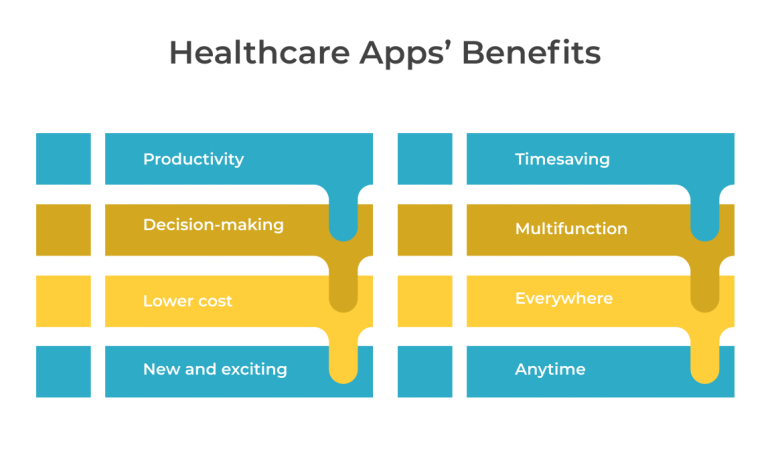
How medical apps help patients and doctors
Securing both patients’ data and the whole information exchange is vital for healthcare mobile application development. The primary goals include building reliable architecture for mobile medical apps, encrypting healthcare data, and following governmental regulations.
Encrypting medical data is a must for any healthcare app development company. Developers working on such software follow standards and guidelines to keep transmitted information encrypted at every stage. There are decryption keys or passwords for authorized personnel that can view and manage patients’ sensitive data.
Privacy and security standards can be rather different in various regions of the world. When you create a healthcare application, where will people use it? Let’s consider some examples.
In the United States, healthcare app developers must be compliant with the Health Insurance Portability and Accountability Act (HIPAA). There are governmental requirements for sharing Protected health information (PHI) between all kinds of healthcare providers. However, medical apps for patients’ personal use are not subject to HIPAA.
In Canada, there is the Personal Information Protection and Electronic Documents Act (PIPEDA) to regulate medical mobile application development. PIPEDA protects privacy and sets the rules for organizations to collect, store, use, send, and disclose sensitive information.
In Asian countries, healthcare mobile apps for patients must follow various privacy laws. For example, the Personal Data Protection Act (PDPA) in Singapore or the Personal Information Protection Act (PIPA) in Japan.
In the European Union, you must follow the General Data Protection Regulation (GDPR) when building mobile medical applications. The Regulation sets rules for all EU citizens and protects their personal data even if a healthcare provider is located in another country. Alongside health records, personal data includes names and photos, usernames and IP addresses, phone numbers, etc.
In the United Kingdom, there is the Data Protection Act (DPA) for the industries dealing with personal information, which includes healthcare app development.
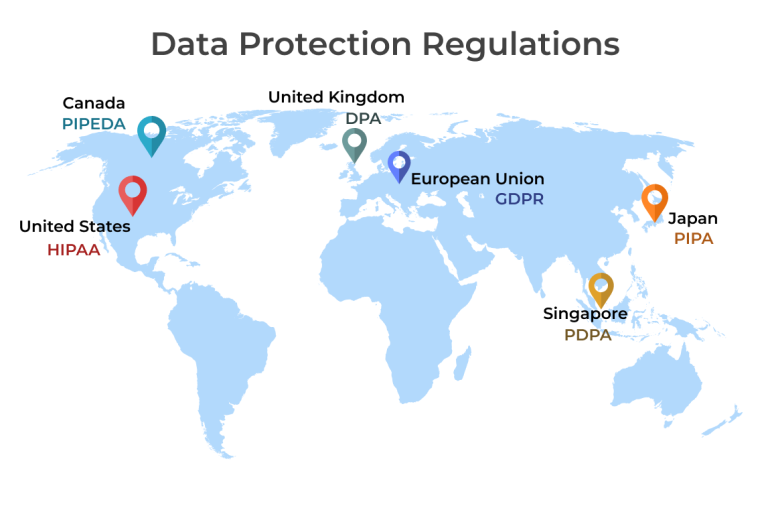
Data protection standards in different countries
Present-day mobile devices have relatively small screens, and one of the challenges for healthcare app development is conveniently presenting digital content for users. This is why apps need a well-designed user interface (UI) and user experience (UX).
These are some best practices for healthcare app developers:
The above-mentioned practices are applicable to any kind of apps. They are also the golden standard for medical mobile application development, and you can notice those principles being used in the best healthcare apps around the globe.
The process of UI/UX design for healthcare applications will take approximately 20-25 days.
Today, there are over 300,000 mobile medical apps available in popular stores. Most of the large clinics have their own application for patients and physicians. However, surveys show that only 11% of these products satisfy their users’ needs. The most common mistakes are confusing interfaces and the lack of vital functionality.
How can you avoid those pitfalls? Study customer expectations and keep them in mind while creating healthcare mobile apps for patients.
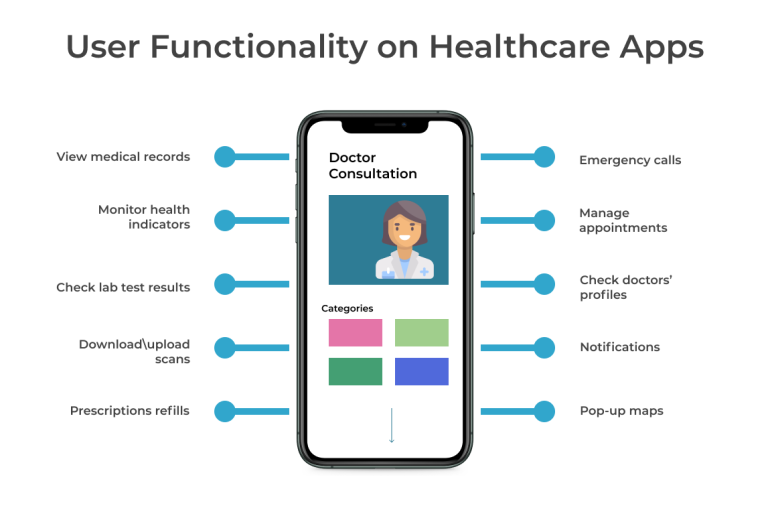
Core functionality of healthcare apps
Mobile medical apps should let users:
If you want to build a mobile medical app, you should understand its purpose and functions. Study the possible features before seeking consultation with a healthcare app development company.
Do you want to get maximum information about healthcare mobile applications? We advise you to read our guide on features and technologies to build for a pharmacy app. It may help you select some advanced features or integrations for your healthcare solution.
With the help of healthcare mobile app development, the end-product may get the following features and integrations:
Suppose you’ve decided on your app’s basic functionality. When you choose a healthcare mobile app development company, the specialists may use different tech stacks to design and build those features.
Do you want to know what we apply here at ADEV? Look at some examples in the chart below.
| Features | Technologies |
| Frontend iOS/Android development | React Native, Java |
| Databases encryption and storage | MongoDB, Amazon RDS, PostgreSQL |
| Cloud integration | Amazon Web Services (AWS) |
| Geolocation | Google Maps |
| E-mail registration | Amazon SES, Twilio, Mandrill |
| Social sign-in and log-in | Facebook, Google, LinkedIn |
| Push notifications | Twilio, Amazon SNS |
| Payment gateways | PayPal, Stripe, Braintree |
| Video Conferencing | WebRTC, Twilio, CometChat |
| Chatbots | Python, spaCy, TextBlob, Gensim, CoreNLP |
| In-app analytics | Google Analytics, Apache |
Implementing the necessary features will take approximately 35-40 days (for one mobile platform). As to the cost of healthcare mobile app development, it usually depends on your projects’ sophistication (how many features, platforms, third-API integrations, etc.)
You will need a reliable team of developers and other IT professionals to implement all the necessary features using cutting-edge technologies.
One of the hiring models is outsourcing excellent specialists. Another option is a dedicated team. This way, you’ll be able to find a healthcare mobile app development company with sufficient experience.
When you’re looking for the team that builds mobile medical applications, these six factors are worth considering:
Given that medical software works with lots of secure data, all healthcare applications require a lot of professional testing before launch. It allows finding hidden bugs and potential security breaches, helps enhance the user experience, and increases your app’s credibility at the end of the day. The development of medical mobile applications is full of various challenges. Before launching your product to the stores, ensure that you’ve avoided common pitfalls leading to medical software’s failure.
| Mistakes | How to avoid |
| No compliance with privacy regulations | Study the rules for managing sensitive use data in the country where you run your business or organization. If needed, hire a lawyer. |
| Poor user experience | Hire professional UI/UX designers to fix the problems. If you don’t, patients and doctors will be reluctant to use your app and soon leave it for a more convenient one. |
| Lack of development quality | Only experienced specialists can do healthcare mobile app development that satisfies users’ needs and brings value to your business. |
| No proper testing | Even well-designed and professionally developed medical apps may fail if not tested before launch. This stage is worth time and budget as it helps find all weak spots and fix them before users may notice. |
Are you planning to create medical apps for patients or other kinds of digital products for healthcare? Here at ADEV, we can build smoothly-working software for healthcare providers and patients.
Let’s work together on giving life to your ideas! Tell us your story, and we’ll get you a professional team of healthcare app developers.

